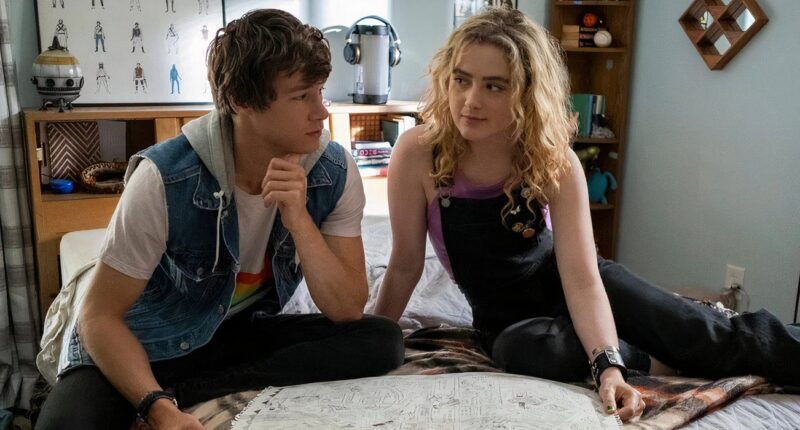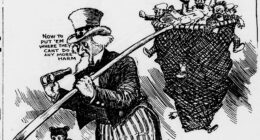Time loops in cinema are a risky plot device that could deliver either a generic film or a reinvention of the genre. The last few years have leaned into the latter, with worthy additions like Palm Springs and Happy Death Day spilling this soft sci-fi formula into rom-coms and horror, respectively. In 2021, Ian Samuels’ The Map of Tiny Perfect Things trapped Kyle Allen’s Mark and Kathryn Newton’s Margaret in this same temporal anomaly. As the film explores their interaction and reaction to the time loop, a tender coming-of-age story unfolds. This is also one of the films that has built Newton as a sci-fi icon, daring to say that it might be more relevant than Ant-Man and the Wasp: Quantumania.
‘The Map of Tiny Perfect Things’ Puts a Spin on the Typical Time Loop Formula
The Map of Tiny Perfect Things doesn’t waste any time detailing its characters’ lives pre-time loop, plunging us into their new reality from the start. There’s an initial focus on Mark, who’s resigned to living this day forever. He’s already at the point where he does things for the laughs, like driving a tractor through town and buying winning lottery tickets—knowing none of it matters in the end. Through these moments, he also finds time to pursue his drawing passion, while also trying (and failing) to connect with a girl who’s hit daily by a beach ball.
The film pulls the rug out from under Mark, and the audience, when he comes across Margaret, a girl who’s been trapped in the time loop for a while as well. After having had endless similar conversations with his best friend Henry (Jermaine Harris) and his father Daniel (Josh Hamilton), Margaret is a breath of fresh air for Mark. The spark between Allen and Newton builds up this relationship through quirky interactions and heartfelt looks. So, even when Margaret seems determined on ignoring him, there’s a magnetism that brings them, if not out of the time loop, into their emotional loop, at least. This way, they put a spin on this repeating day and start finding the magic in everyday events.
Mark and Margaret Learn What’s Worth Repeating in ‘The Map of Tiny Perfect Things’
With their lives gradually intertwining, The Map of Tiny Perfect Things puts Mark and Margaret on the inevitable road of trying to break out of the time loop. Mark poses the theory that, if they find all the perfect moments happening that day in town and map them out, they might achieve it. After this doesn’t work, he convinces Margaret to fly all the way to Japan to cross the International Date Line and into the next day. Margaret backs off at the last minute, leaving him alone to discover this was just another failed attempt.
Margaret icing Mark is how Lev Grossman’s script finds an interesting way to continue turning the tables on this ride. So, while Mark wants to break out of the time loop, Margaret wants to stay in it for reasons unknown. Mark doesn’t suffer from toxic masculinity, so he respects Margaret’s decision, making peace with her not being in his life anymore. Whereas at the beginning of the film we see him doing things differently just for fun, the ripples of Margaret’s impact are seen when he starts changing events to make the day truly better for other people. Simple things like rescuing a cat, hugging his mom, or finally going to his sister’s soccer match, become fulfilling emotions that see this teenager evolve.
Margaret Has a Valid Motivation for Wanting to Stay in ‘The Map of Tiny Perfect Things’ Time Loop
When The Map of Tiny Perfect Things goes back to Margaret, her reticence on breaking the time loop is finally explained—for this is the last day her mother lives. Whereas every character in a time loop film wants to get out of it, Margaret has a raw and valid motivation to keep reliving the same day. It also makes her the center of the film and almost certainly the cause of it. It’s as if her wish of keeping her mother alive brought the temporal anomaly upon them.
After she discovers the map is indeed the way to break out of the loop, she comes to terms with letting her mother move on. The last perfect thing left to complete the map is her and Mark coming together at the town’s public pool—finally breaking the loop. But it’s not just about them becoming a couple, but rather about Margaret realizing she has a support system, even with her mother gone. Allen and Newton’s chemistry makes The Map of Tiny Perfect Things go from rom-com to coming-of-age to a soothing exploration of grief. If you want to see Newton dealing with time shenanigans, it’s probably best to do it with this film and not with her MCU debut.










